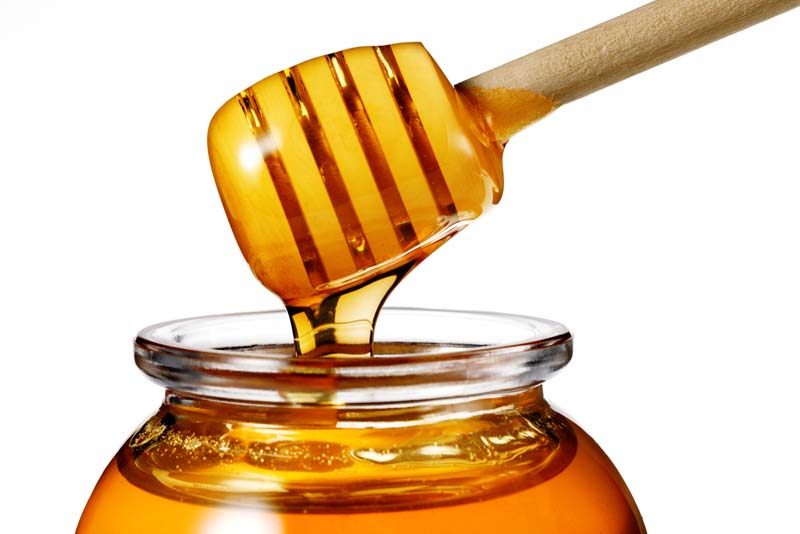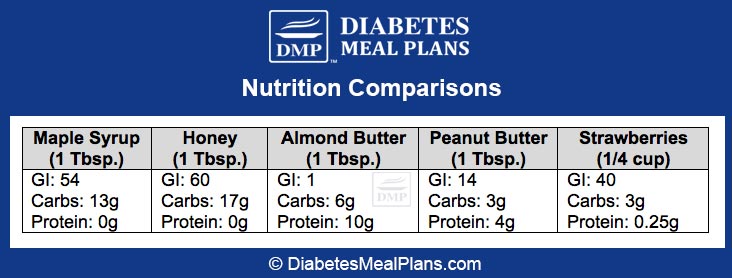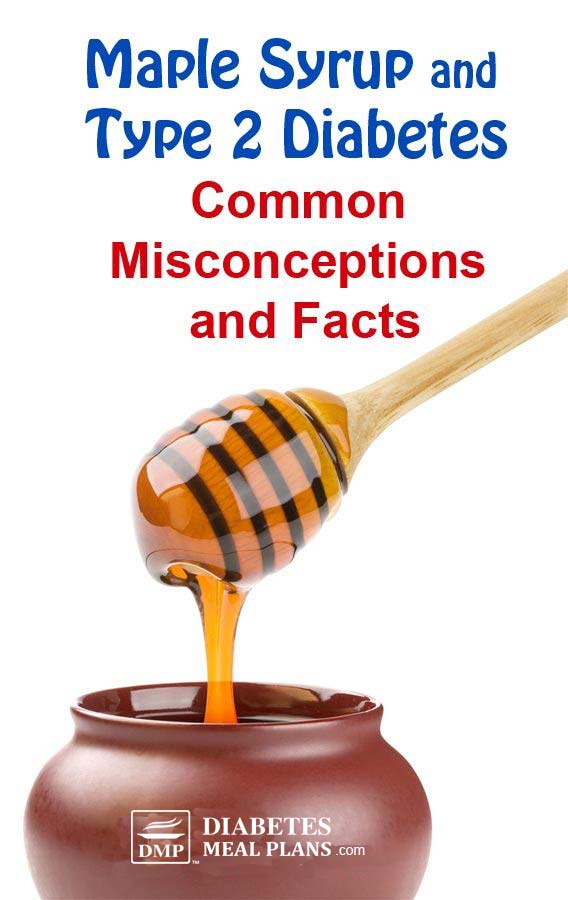If you’re wondering is maple syrup ok for diabetics, the quick answer is, not really.
Maple syrup is a sugar and like other sugars it is quickly taken up into the blood stream and can lead to blood sugar spikes.
To learn more about maple syrup for diabetes, keep reading the facts below.

What is Maple Syrup?
Maple syrup is a popular sweetener that’s commonly eaten with breakfast foods like pancakes and waffles. It’s produced by draining the sap of specific breeds of trees like the sugar maple and the black maple.
These trees are indigenous to Canada and northern regions of the United States. But maple syrup is enjoyed all over the world. After the sap is collected, it’s heated and concentrated into a viscous liquid that is very high in sugar.
Because maple syrup is a “natural” sweetener, many people with diabetes assume that it must be safe to eat. The instant thinking is, “it must be better than sugar, right?”
Not exactly. That is a common misconception, it is very high in sugar.
Nutrition facts
The reality is, maple syrup is just pure sugar!
A one tablespoon serving of the sweet syrup has zero fiber, zero fats, and zero protein, all the things that help balance your blood sugar levels.
It contains 13 grams of simple carbohydrates per tablespoon, which means that it will raise your blood sugar much more quickly than a complex carbohydrate (like vegetables) would.
The lack of fiber makes syrup a poor choice for people with diabetes because there is nothing to slow that sugar down when it enters your blood stream – plain and simple.
Compared to table sugar, maple syrup does contain trace amounts of some nutrients – potassium, magnesium, and calcium. But not nearly enough to justify eating 13 grams of sugar per serving.
Sure a serving of maple syrup may provide you with 42 mg of potassium…but if you swap that syrup out for half an avocado you get almost 500 mg of the same mineral, but with none of the sugar!
Maple syrup is around 40% fructose and we’ve covered the topic of fructose before and why it should be avoided.
When consuming sweet syrups like maple syrup, it is often difficult to stick to just one tablespoon. Instead, people tend to smother their pancakes or waffles and can easily push their sugar intake up even more.
Breakfast Toppings Compared
While maple syrup is a popular topping for breakfast foods, it is not the only choice available.
Take a look at the following chart:

You can see that viscous sweeteners like syrup and honey are high in carbohydrates, low in protein, and have a higher glycemic index (GI).
If you swap out that syrup for a spoon full of unsweetened peanut butter, you end up with only 3 grams of carbohydrates, a lower GI of 14, and 4 grams of protein that will keep you feeling fuller much longer than a breakfast topped with sugary syrup.
Low carb fruits like strawberries, blueberries, raspberries and cherries can add natural sweetness. And for a healthier sugar substitute, try using stevia sweetener.
Myths and Truths About Maple Syrup
The myth: An organic maple syrup that is “100% pure” is a healthy sweetener that I can use in abundance without any worries.
The truth: There is a common misunderstanding that food products with claims like “pure,” “organic,” or “all natural” are automatically healthier for you.
Yes, a maple syrup that is sourced organically and that has been minimally processed is certainly less unhealthy than a severely processed syrup that has “added” sweeteners, artificial sweeteners or chemicals.
However, just because something is less bad, that doesn’t make it good either!
In terms of diabetes, the amount of sugar/carbs you eat is what matters, and the sugar content in a batch of relatively “clean,” organic syrup is just as high as it is in a cheap syrup.

Research on Maple Syrup and Type 2 Diabetes
A growing amount of evidence suggests that a low carb diet is the best option for type 2 diabetics who are looking to improve their condition. And quite simply, maple syrup just doesn’t fit into a low carb diet plan.
On top of improving blood sugar and A1c levels, reducing insulin production, improving insulin sensitivity, a lower carb diet has also been shown to improve cardiovascular risk factors such as improving cholesterol profile, along with better weight loss results, especially loss of abdominal fat.
In terms of fructose and diabetes, the food and the condition just don’t make a good match. Maple syrup is lower in fructose than honey (80%) or table sugar (50%), but it does still contain around 40%.
Consumption of fructose has been linked to increased weight gain, higher triglyceride levels (cholesterol), high blood pressure, insulin resistance, higher small dense LDL cholesterol and fatty liver – none of which will help improve your type 2 diabetes!
Maple Syrup Replacements
Being there is a growing awareness of diabetes and the positive impacts of eating a lower carb eating plan, you can now purchase low carb maple syrup options.
What’s the Final Word on Maple Syrup?
The votes are in and the winner is…not maple syrup!
It is clear that maple syrup has no place in a healthy diabetic diet because it is very high in sugar/carbs and it has no real value to offer in terms of nutrition.
Next time you’re tempted to pour some syrup on your breakfast, why not opt for a topping that is high in protein and healthy fats, like almond butter instead? But if you must have maple syrup, choose a low carb alternative and use it sparingly.
As for sugar substitutes, we predominantly use stevia. Other reasonable options include xylitol, erythritol and monk fruit.
Please pin, tweet or share this info to help others. Thanks!

Brandii McCabe
WHAT IF I USE MAPLE SYRUP IN SOME RECIPES AND I AM DM TYPE 2? THESE RECIPES ARE FULL OF VEGGIES AND ONLY USE ABOUT 2 TABLESPOONS ADDED TO THE DISH WHICH NORMALLY SERVES ABOUT 3.
Dr Jedha - Nutritionist (PhD)
Hi Brandii, 3 Tbsp of maple syrup in a dish that serves 3 will add about 8.6g carbs to the dish, so you would need to make this decision dependent on what else the dish contains. For optimal blood sugar control, we encourage people to keep meals between 10-25 g carbs per meal.
Helen
I can’t stand the taste of artificial sweetner, they are really bad for you. I’m diabetic and hating the taste in sugar free products in shops. I just can’t eat it without to sick
Dr Jedha - Nutritionist (PhD)
They can take a bit to get used to and using less is more with the sweeteners. There is a difference between artificial sweeteners and the more natural sugar substitutes available and there are now a wide variety with different tastes so perhaps you could try different ones to what you have tried already. Not all sweeteners are bad for you. We’ve written a recent update on erythritol here and you can find more on sugar substitutes here.
Lawrence E Kolmonen
Erythritol and stevia cause blood clots is the word going around. i have used stevia for years and now am on blood thinners because of clots?
Dr Jedha
Don’t believe the crazy ‘word’ that goes around on the wild west web Lawrence. There is ZERO evidence that stevia leads to blood clots so the fact you’re on blood thinners is highly unlikely to be related in any way. We’ve got a podcast coming on sweeteners soon, so stay tuned for that. I see you’re on our email list, so we send podcast updates out when new episodes are published.
Amanda
I have going back and forth about syrups. If used in a smaller amount which would be a better option, a low sugar option, where it’s chemically made, or pure maple syrup?
Emily - Dietitian (MS, RD)
A lot of this comes down to personal opinion, especially if you are truly referring to small amounts here or there. One question I would ask if how is your current glucose control? If you are generally well controlled than maple syrup, although a high carb food, might be more tolerable (but check your sugar level after consuming to be sure.) If you are already struggling with high blood sugar spikes then you would likely benefit from something lower in sugar.
wade schriner
what about using it in baked beans so there is a lot of fiber and protein?
Dr Jedha - Nutritionist (PhD)
Baked beans are already a carbohydrate Wade, so adding more sugar is not recommended, despite them having some fiber and protein.
ARJAY
Can you use grass fed pastured cow butter instead of almond butter or unsweetened peanut butter?
Emily - Dietitian (MS, RD)
Absolutely. Butter is blood sugar friendly and the fats can help you feel fuller longer after your meal. Read more about butter here!
Angelina
So you are saying that NO MAPLE syrup for diabetics people no matter type 1 or 2?
Malorie: Dietitian (MS, RD, CLT)
Hi Angelina,
We are primarily speaking to those with Type 2 diabetes but it still isn’t a food I would recommend for regular consumption for someone with type 1 either due to the high carbohydrate content.
pamela mccleary
what about sugar free maple syrup ?
Jedha: Nutritionist (MNutr)
It depends on the sugar substitute it uses. Many use aspartame, which we don’t recommend, while stevia, monk fruit or erythritol are better options. But if it’s only occasionally it likely won’t do any harm.
James Lynch
I have been drinking 2 Tbl maple syrup and water in eight hours for two months. I work a very physical job, and I am loosing weight and my blood pressure has finally dropped to 125/75. I don’t notice any adverse effects.
Emily - Dietitian (MS, RD)
What happens if you do not consume the maple syrup water? Do you feel you need the water because your blood sugar would drop low without it?
You may be better off eating snacks every few hours as this would offer your body more vitamins and minerals compared to the maple syrup. I do not suspect the weight loss or blood pressure is directly tied to this drink. In fact, all you’re drinking is sugar water and added sugar in any form is definitely something you should strive to avoid.
James Lynch
I feel a drop in energy when I stop drinking it. I have heard that your brain runs on sugar. I have to think very fast, and I just don’t do as well without it. I don’t have time to stop to snack, and they don’t allow me to snack while I am working.
Gary
How about Truvia? Not as healthy but it does bake well. Otherwise I use no other sweeteners than Truvia baking mix and Stevia.
Jedha
Sounds like you’ve done your homework Gary. Truvia is a suitable option. It’s a blend between stevia and erythritol. And you’re right, often the blends do make baking easier.